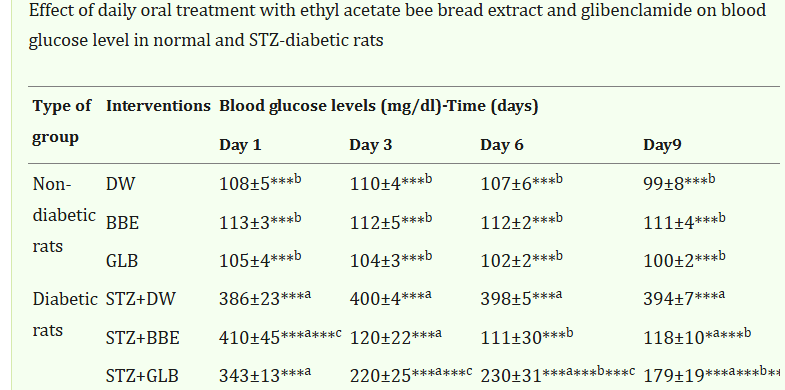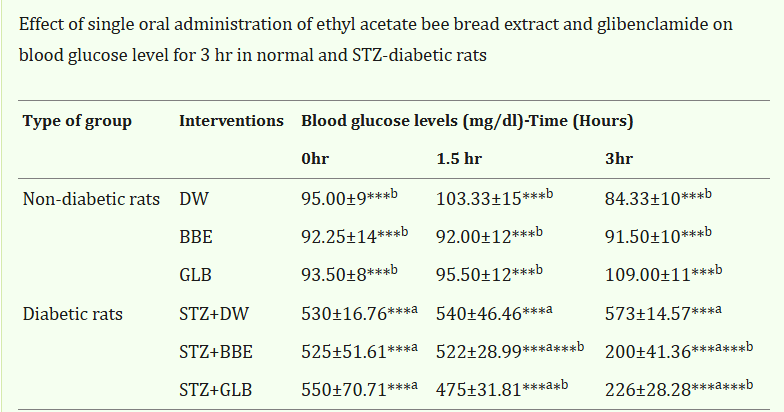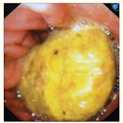Random, interesting studies
-
@Mauritio honey /most bee products /chyrsin rich foods generally increase testosterone.
-
@alfredoolivas said in Random, interesting studies:
Doesn’t the hot water cause hydrolysis ?
apparently too slow by itself so they do extra processing
@Mauritio said in Random, interesting studies:
Anybody tried bees bread ?
In this study it did wonders for steroid health.nice , & a potent effect really fast in a diabetes model. normalised by 3 days. fastest effect ive seen
STZ model = destruction of pancreas cells so i guess its most relevant to type 1 , or if someone with type 2 has lacking pancreatic islet cells too as part of their problem. full damage was done initially so shows good effect

they used an extract ~30mg polyphenols 5mg flavanols per gram so maybe ~ 5g bee bread for 1g of extract
composition varies a lot by location if it was the polyphenols giving most of the effect even in same country by region,
theirs was high inkaempferol-3-O-di-rhamnosideIsorhamnetin-O-hexosyl-O-rutinosidehttps://pmc.ncbi.nlm.nih.gov/articles/PMC8264221/#sec7
and if you believe the results,
they showed its acute effect (didnt lower blood sugar when not elevated)

Which is odd. because its not lowering glucose in non diabetic rats so its not acting like insulin right? unless things are effectively counteracting it in the normal group because it would be crashing otherwise from insulin secretion. (at 3hrs in the DW group they had lower blood sugar though 84 vs 92)
unlikely enough islet cells left from the damage to stimulate insulin secretion for such a drastic change in both of the groups, which is what GLB doe? idk maybe there is but they're clearly wrecked from such high glucose at 0hr. 3 hours isnt enough time to regenerate the islet cell damage -
@cs3000 said in Random, interesting studies:
apparently too slow by itself so they do extra processing
Could I finely dice it up and put it in a pot of boiling water for 15 minutes, whilst it remains boiling for the entire 15 minutes? would that be effective?
-
@alfredoolivas i'd guess it takes a lot longer still but not sure ,
if youre interested in it for the octacosanol sugarcane wax is better only need a little already in a good form https://bioenergetic.forum/post/47406 supplements are around tho -
Again, TLR 4 /Endotoxin implicated inInfections, not just bacterial ones, but also viral.
"TLR4-dependent viral entry was further validated by an anti-TLR4 antibody-mediated blocking experiment. It was noticed that TLR4 is necessary for the early events of viral infection, especially during the attachment and entry stages."
https://pmc.ncbi.nlm.nih.gov/articles/PMC10157217/
Endotoxin might not just be implicated in viral entry, but long term consequences of viruses .
The drug larazotide is being researched for long covid symptoms. It basically works in a way that it prevents endotoxin from entering circulation . -
@cs3000 said in Random, interesting studies:
@Mauritio
one in dogs vs birds (fig 2 , its not policosanol tho general
fatty acid esters absorbed a little but the fatty alcohol ester didnt https://www.researchgate.net/publication/21739344_Comparative_aspects_of_lipid_digestion_and_absorption_Physiological_correlates_of_wax_ester_digestionbut looked a bit further for specific, rats can digest even more of it if its esterified specific to oleic acid
but thats synthetic esterification not bound with oleic acid normally https://grasasyaceites.revistas.csic.es/index.php/grasasyaceites/article/view/1388 , couldnt find if humans could absorb some but theres a case of a women with gastric blockage who ate a lot of honeycomb so at least a lot goes undigested
https://pmc.ncbi.nlm.nih.gov/articles/PMC2740191/#s02

was still worth posting your post now i know more about it & wouldnt have@Mauritio said in Random, interesting studies:
for it beeing indigestible for us ?


study from that megathread showing good anti blood clotting property of policosanol https://pubmed.ncbi.nlm.nih.gov/9425618/
Seems right. For some reason birds seem to be good at it. Humans not. Such a shame.
And interesting studies you posted on Bee bread. Quite the strong effect indeed.
-
Im not convinced that low protein is dangerous and catabolic, mid - long term in people under 65.
I recently posted a study showing 5 weeks of 8% protein in the diet did not cause muscle loss. After which someone said that isnt long enough .
Now here's a study showing that 12 weeks of a very low 0.4g/kg/d, ~5%protein diet does not lower basal muscle protein synthesis!
https://journals.plos.org/plosone/article?id=10.1371%2Fjournal.pone.0137183It seems to come down to age as well.
Here it gets interesting: if you're under 65 and eating a high protein diet, that is strongly associated with death, cancer and diabetes . Over 65 it seems to be protective !"...aged 50–65 reporting high protein intake had a 75% increase in overall mortality and a 4-fold increase in cancer and diabetes mortality..."
https://pmc.ncbi.nlm.nih.gov/articles/PMC3988204/Not sure why. Low protein diets can lead to lower thymus weight, as seen in this study (https://www.scielo.br/j/bjmbr/a/MGBdr7CsJTMQrf7Bhjbdv3z/?lang=en)
And older people are more susceptible to infections and chronic inflammation .So maybe after 65 the increase
in Protein and inflammatory amino acids is worth the trade off, for increased immunity and suppression of inflammation .
Maybe it's simply the lesser of 2 evils at that point .
What do you guys think? -
@Mauritio said in Random, interesting studies:
What do you guys think?
After 60 yrs, 2 - 5% % loss is usual, according to activity.
Main causes to fight against (things happening in our bodies as we age that might contribute to sarcopenia):
Reduction in nerve cells responsible for sending signals from the brain to the muscles to start movement.
Lower concentrations of some hormones, including growth hormone, testosterone, and insulin-like growth factor
Increases in inflammation, partly due to disease
A decrease in the ability to turn protein into energy.So, if we can slow down these processes, we could better manage ...
Law of nature: if not able to reproduce, if not able to transmit knowledge, we become a weight for society.
Note I don't feel it that way
-
@Mauritio - I am wary of drawing conclusions from studies that lump people into groups based solely on their protein intake. It is too broad-brush for me. For example, is it the high protein or the skewed calcium to phosphorous ratio in the high protein group? Is it the high protein or the change in the glycine to methionine ratio?
Aging is complex. For a more holistic approach, see Ray Peat's 2015 newsletter:
-
@Mauritio

In the first study, the 5% protein diet, caused 0.32% loss in free fat mass.Which is almost nothing right? very interesting.
-
@DavidPS It is speculative for sure . But the effect was strong. A 75% increase in overall mortality is pretty wild.
It hints at low protein being safe. That's what I'm getting at . If it was harmful, it would be unlikely to have such a drastic effect.
-
@alfredoolivas yeah that's negligible. Pretty wild . Thanks for sharing.
And Im not sure people realize how low 5% is .10% is doable .
8% is somewhat doable, but 5% is really hard . Especially for 12 weeks.I remember posting the 8% study on reddit and some smartass was like : "Good luck loosing all your muscle" ...
Basically zero muscle loss after 12 weeks of 5% protein is pretty impressive.
-
Seems like they do eat the honeycomb as well.
@cs3000
Youtube Video -
@Mauritio said in Random, interesting studies:
Seems like they do eat the honeycomb as well.
@cs3000
Youtube VideoThere's no moment in this video where we see the Africans eating the honey for several seconds without the shot changing, so there's not even time to see if they swallow it or spit the comb out after chewing, there is 2 hunters eating honey, and the first hunter legit still has a ball of wax in the inside of his right cheek right before camera switch. Are you looking for confirmation bias?
-
@random Yeah maybe they spit it out. Just came across this video randomly and thought it was interesting.
-
@Mauritio said in Random, interesting studies:
@random Yeah maybe they spit it out. Just came across this video randomly and thought it was interesting.
I suggest try to find videos where the camera focus on the hunters for long enough with out switching to see if they spit or swallow the comb
-
@Mauritio wax is about 10% of the size when u chew it down so they might let it build up a bit
in this one the older guy spits out the wax (& the dude with the 80s hairstyle)
https://www.youtube.com/watch?v=yJXpp8A1MSA#t=34m35s
and the guy on the right did https://www.youtube.com/watch?v=KMbbxwLyZLc#t=23m22s but the guy on the left was swallowing some tho https://www.youtube.com/watch?v=KMbbxwLyZLc#t=19m25scan build up & block the stomach / intestine anyway swallowing enough at once and not much to gain as can get the compounds in the wax other places & absorbed
-
@cs3000
Thanks for clearing up this issue of the policosanols in beeswax being non-hydrolysed and therefore essentially useless.I had been using 20mg policosanols daily (the Swanson product) for a couple of months: Mildly beneficial for digestion and maybe overall.
Then I had used yellow beeswax for a while and every now and then at equivalent amounts of c. 2grams, as per the older info on the RPF, and that never helped with anything and distinctly worsened digestion. From your answer I now finally know why. -
@CrumblingCookie np ah fits then, funny how this stuff works sometimes. soon after seeing this i got honeycomb as a gift. probably would have ate a decent amount & irritated my intestine damage more if not for this thread & looking into it. great timing
-
@cs3000 same I was about to reorder honeycomb from Italy, but don't want to risk stomach blockade or anything similar.